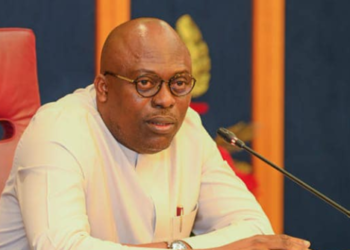Itsey Sagay, Chairman of the Presidential Advisory Committee against Corruption, says the National Judicial Council (NJC) does not have the power to preside over cases of wrong asset declaration of any judge.
Speaking in Abuja on Wednesday, Sagay said the provision of the Code of Conduct Bureau (CCB) precludes NJC from deciding on the case of any judge that is accused of not declaring his assets.
He argued that: “If he is removed from office by the NJC and he ceases to be a judicial officer as well as a public officer, can he, therefore, be tried as a public officer before the Code of Conduct Tribunal? The answer is no, because he is no longer a public officer. The extant provisions of the Constitution and the Code of Conduct Bureau and Tribunal Act would be rendered nugatory, by a prior NJC involvement.”

The senior lawyer disagreed with the argument that the CCB cannot try Walter Onnoghen, the Chief Justice of Nigeria, who was accused of fraudulent asset declaration.
He reasoned that the Code of Conduct Tribunal has the mandate to prosecute any officer found wanting on the code of conduct ethics.
He continued: “After a perusal of the application and evidence in support, and if satisfied with such evidence, the tribunal shall cause the defendant to be brought before it on such a date and such a time as it may direct.
“When the tribunal is ready to commence trial, the defendant shall be brought before it and the tribunal shall read or cause to be read to the defendant the substance of the complaint against him and he shall be asked whether he is guilty of the offence or offences as charged.”
According to Sagay, the lawyers opposing the CCT trial of the Chief Justice “must obviously be speaking tongue in cheek”.
He added: “Even a baby must realise that no one can get justice against the Chief Justice of Nigeria at the NJC. The CJN is not only the Chairman of the NJC, he is also the appointor of 20 out of the NJC’s 23 members. The CJN is the NJC. Only a grossly ignorant man or an extremely mischievous one could seriously suggest that a matter involving the CJN should be brought before the NJC for adjudication.
“Therefore, the whole idea of taking the present case to the NJC is a non-starter. For that would make the CJN the chief judge of his own case, a clear violation, not only of the Constitution but also of a long standing common law principle coming all the way from MAGNA CARTER in the year 121.”
Onnoghen was absent at his arraignment on Monday, claiming he was not personally served the charge sheet.
Danladi Umar, chairman of the tribunal, then ordered a fresh service of the summons on the CJN personally and consequently adjourned till January 22 for arraignment.








